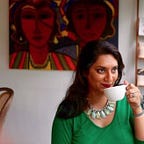Phoebe Waller Bridge’s artistic vision is a hot commodity. But its chaotic appeal can only go so far for some of us.
When Phoebe Waller Bridge’s hit Edinburgh Fringe show-turned-television-program Fleabag came to Amazon Prime, I heard about it before I saw it. In Pakistan, we don’t have access to the same programs as you do in the United States or Britain because of copyright restrictions, so it took me a while before I could watch the entire series, which I did finally when I traveled to the UK and watched it online.
For several months, I’d read about how good Fleabag was, how honest, what fabulous entertainment it was, capturing the entire zeitgeist of an entire generation of young women struggling to find their way in a random world. I couldn’t wait to watch it for myself to see if everything being said about it was true. I love a good pop culture moment as much as the next person, and I readied myself to be charmed.
Fleabag is a 20- or 30- something woman struggling through grief, financial precariousness, and emotional repression, using sex to assuage the pain that sex had got her into in the first place. We are introduced to her London life, her guinea pig cafe and her difficult relationships with her father, soon-to-be stepmother and repressed older sister.
